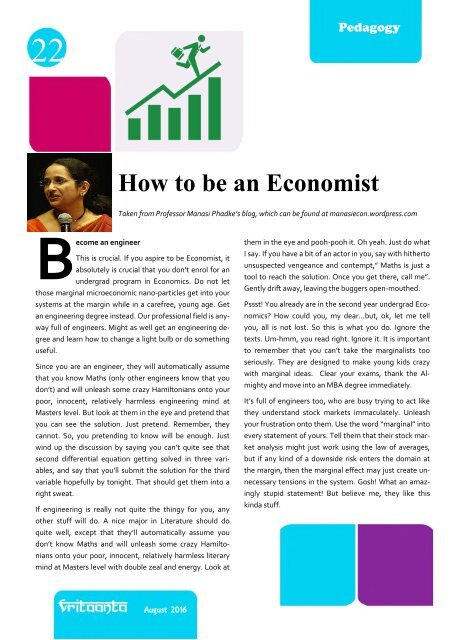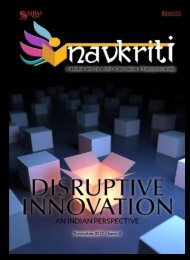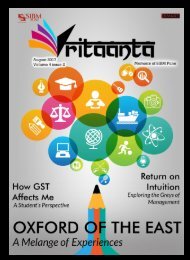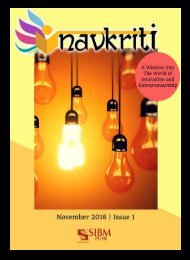Vritaanta Volume 3 Issue 1 August 2016
The PR Team of SIBM Pune is happy to present the latest issue of Vritaanta. The cover story for Vritaanta ‘United by SIBM’ highlights the cultural and educational diversity present at our ‘lovely’ lavale campus. Flip to page 12 for the full story.
The PR Team of SIBM Pune is happy to present the latest issue of Vritaanta. The cover story for Vritaanta ‘United by SIBM’ highlights the cultural and educational diversity present at our ‘lovely’ lavale campus. Flip to page 12 for the full story.
Create successful ePaper yourself
Turn your PDF publications into a flip-book with our unique Google optimized e-Paper software.
12 22<br />
Pedagogy<br />
Ground Zero<br />
B<br />
ecome an engineer<br />
This is crucial. If you aspire to be Economist, it<br />
absolutely is crucial that you don’t enrol for an<br />
undergrad program in Economics. Do not let<br />
those marginal microeconomic nano-particles get into your<br />
systems at the margin while in a carefree, young age. Get<br />
an engineering degree instead. Our professional field is anyway<br />
full of engineers. Might as well get an engineering degree<br />
and learn how to change a light bulb or do something<br />
useful.<br />
Since you are an engineer, they will automatically assume<br />
that you know Maths (only other engineers know that you<br />
don’t) and will unleash some crazy Hamiltonians onto your<br />
poor, innocent, relatively harmless engineering mind at<br />
Masters level. But look at them in the eye and pretend that<br />
you can see the solution. Just pretend. Remember, they<br />
cannot. So, you pretending to know will be enough. Just<br />
wind up the discussion by saying you can’t quite see that<br />
second differential equation getting solved in three variables,<br />
and say that you’ll submit the solution for the third<br />
variable hopefully by tonight. That should get them into a<br />
right sweat.<br />
How to be an Economist<br />
Taken from Professor Manasi Phadke’s blog, which can be found at manasiecon.wordpress.com<br />
If engineering is really not quite the thingy for you, any<br />
other stuff will do. A nice major in Literature should do<br />
quite well, except that they’ll automatically assume you<br />
don’t know Maths and will unleash some crazy Hamiltonians<br />
onto your poor, innocent, relatively harmless literary<br />
mind at Masters level with double zeal and energy. Look at<br />
them in the eye and pooh-pooh it. Oh yeah. Just do what<br />
I say. If you have a bit of an actor in you, say with hitherto<br />
unsuspected vengeance and contempt,” Maths is just a<br />
tool to reach the solution. Once you get there, call me”.<br />
Gently drift away, leaving the buggers open-mouthed.<br />
Pssst! You already are in the second year undergrad Economics?<br />
How could you, my dear…but, ok, let me tell<br />
you, all is not lost. So this is what you do. Ignore the<br />
texts. Um-hmm, you read right. Ignore it. It is important<br />
to remember that you can’t take the marginalists too<br />
seriously. They are designed to make young kids crazy<br />
with marginal ideas.<br />
Clear your exams, thank the Almighty<br />
and move into an MBA degree immediately.<br />
It’s full of engineers too, who are busy trying to act like<br />
they understand stock markets immaculately. Unleash<br />
your frustration onto them. Use the word “marginal” into<br />
every statement of yours. Tell them that their stock market<br />
analysis might just work using the law of averages,<br />
but if any kind of a downside risk enters the domain at<br />
the margin, then the marginal effect may just create unnecessary<br />
tensions in the system. Gosh! What an amazingly<br />
stupid statement! But believe me, they like this<br />
kinda stuff.<br />
<strong>August</strong> <strong>2016</strong>














